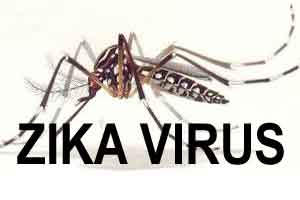- Home
- Editorial
- News
- Practice Guidelines
- Anesthesiology Guidelines
- Cancer Guidelines
- Cardiac Sciences Guidelines
- Critical Care Guidelines
- Dentistry Guidelines
- Dermatology Guidelines
- Diabetes and Endo Guidelines
- Diagnostics Guidelines
- ENT Guidelines
- Featured Practice Guidelines
- Gastroenterology Guidelines
- Geriatrics Guidelines
- Medicine Guidelines
- Nephrology Guidelines
- Neurosciences Guidelines
- Obs and Gynae Guidelines
- Ophthalmology Guidelines
- Orthopaedics Guidelines
- Paediatrics Guidelines
- Psychiatry Guidelines
- Pulmonology Guidelines
- Radiology Guidelines
- Surgery Guidelines
- Urology Guidelines
Zika virus may be used for the treatment of neuroblastoma in children-Dr Manojit Mondal

Zika virus may help in the treatment of neuroblastoma in children, according to a new research.
Neuroblastomas are cancers that start in early nerve cells (neuroblasts) of the sympathetic nervous system, so they can be found anywhere along this system. Most neuroblastomas begin in sympathetic nerve ganglia in the abdomen, about half of these start in the adrenal gland. Neuroblastoma most commonly affects children of age 5 or younger.
Zika virus is an Aedes mosquito-borne deadly virus belong to Flaviviridae family, was first identified in Uganda in 1947 in monkeys. It was later identified in humans in 1952 in Uganda and the United Republic of Tanzania. Zika virus infection during pregnancy can cause several congenital anomalies in fetus called Congenital Zika Syndrome There is no vaccine or medicine for Zika.
Treatment of neuroblastoma is complex and usually involves surgery, chemotherapy or radiation or combination in high-risk cases. In a few cases, none of the treatments works. Prognosis depends on the stage of diagnosis of the disease.
Recently in a primary study, researchers at Nemours Children’s Hospital and the University of Central Florida found that Zika virus has the ability to kill neuroblastoma cells.
After a year of research, the team of researchers published their results which shows that neuroblastoma cells that were exposed to the Zika virus in the laboratory died 10 days after being infected, making the virus a potential treatment for neuroblastoma.
In the research, they identified a surface protein called CD24. Cancer cells that have the CD24 protein are responsive to Zika Virus. CD24 is commonly expressed on primitive nerve cells and is also highly expressed in neuroblastoma. The protein CD24 makes cancer cells susceptible to being killed by the Zika virus. Their team is also finding whether other tumour cells expressing CD24 can be killed by Zika virus or not. The team’s findings published in the PLOS One journal.
To read details of the article log on to-
http://journals.plos.org/plosone/article?id=10.1371/journal.pone.0200358

Disclaimer: This site is primarily intended for healthcare professionals. Any content/information on this website does not replace the advice of medical and/or health professionals and should not be construed as medical/diagnostic advice/endorsement or prescription. Use of this site is subject to our terms of use, privacy policy, advertisement policy. © 2020 Minerva Medical Treatment Pvt Ltd